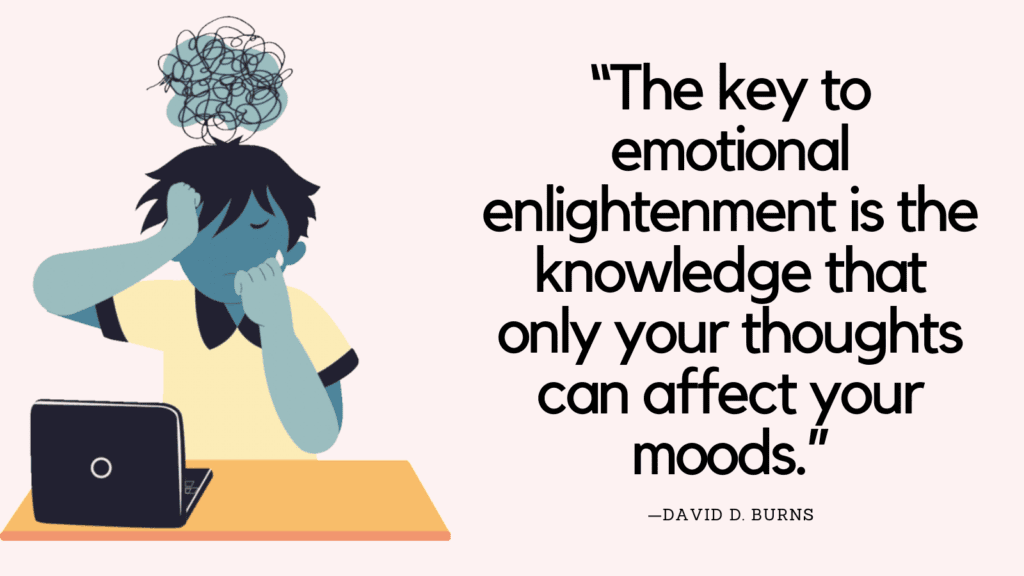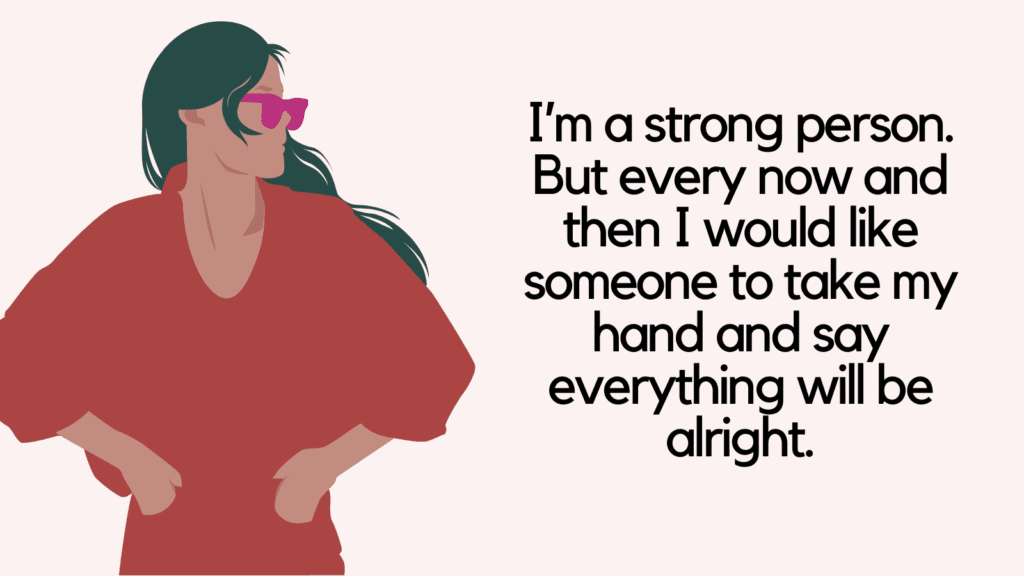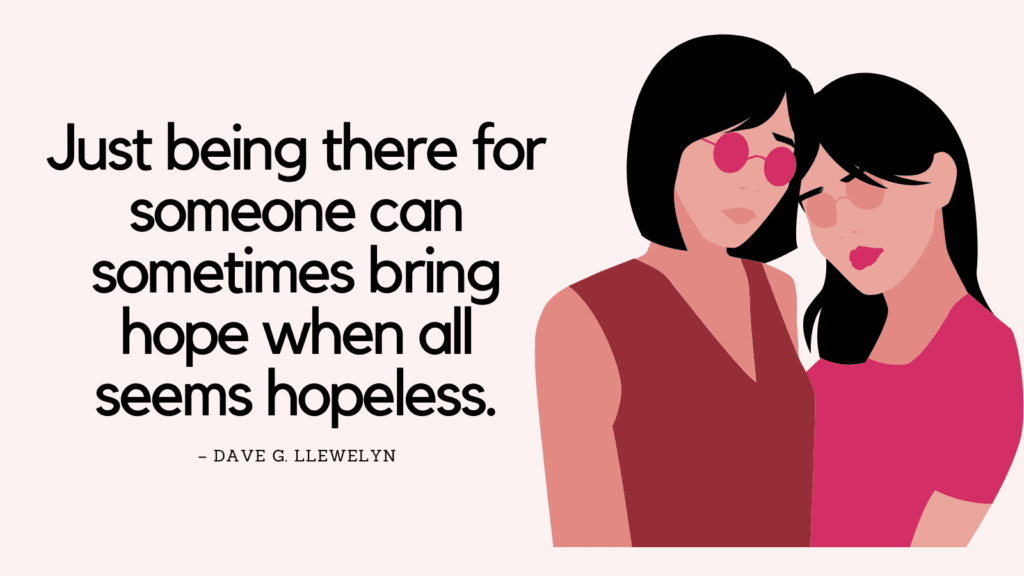This post contains some of the best bad mood quotes.
Bad Mood Quotes
1. “Depression is an illness and not a necessary part of healthy living. What’s more important—you can overcome it by learning some simple methods for mood elevation.”— David D. Burns
2. “You can’t possibly do anything that will make yourself feel better because you are convinced that your moods are caused by factors beyond your control, such as fate, hormone cycles, dietary factors, luck, and other people’s evaluations of you.”—David D. Burns
Related: Best 99 Coping Skills (+FREE Coping Worksheets)
3. “Cognitive therapy is a fast-acting technology of mood modification that you can learn to apply on your own. It can help you eliminate the symptoms and experience personal growth so you can minimize future upsets and cope with depression more effectively in the future.”— David D. Burns
4. “Do you know why virtually any meaningful activity has a decent chance of brightening your mood? If you do nothing, you will become preoccupied with the flood of negative, destructive thoughts. If you do something, you will be temporarily distracted from that internal dialogue of self-denigration. What is even more important, the sense of mastery you will experience will disprove many of the distorted thoughts that slowed you down in the first place.”—David D. Burns
5. “Depression can mimic a great number of medical disorders because your mood swings often create a wide variety of puzzling physical symptoms. These include, to name just a few, constipation, diarrhea, pain, insomnia or the tendency to sleep too much, fatigue, loss of sexual interest, light-headedness, trembling, and numbness. As your depression improves, these symptoms will in all likelihood vanish.”— David D. Burns
Related: Emotional Permanence (What Is It & Top 4 Tips On How To Cope With Emotional Permanence Deficit?)
6. “Individuals who procrastinate frequently confuse motivation and action. You foolishly wait until you feel in the mood to do something. Since you don’t feel like doing it, you automatically put it off. Your error is your belief that motivation comes first, and then leads to activation and success. But it is usually the other way around; action must come first, and the motivation comes later on.”—David D. Burns
7. “The key to emotional enlightenment is the knowledge that only your thoughts can affect your moods.”—David D. Burns
8. “Because depression has been viewed as an emotional disorder throughout the history of psychiatry, therapists from most schools of thought place a strong emphasis on “getting in touch” with your feelings.”— David D. Burns
Related: Best 20 Tips On Dating Someone With BPD Without Becoming A Caretaker
9. “Furthermore, your moods will not go up and down at someone else’s mercy. After all, the amount of love that someone can feel for you is often quite unpredictable. They may not appreciate everything about you, and they may not act in an affectionate way all the time. If you are willing to learn to love yourself, you will have a far more dependable and continuous source of self-esteem.”—David D. Burns
10. “Your moody thoughts are likely to be entirely different from those you have when you are not upset.”— David D. Burns
11. “In short, remembering what you have to feel grateful for will improve your mood and reduce anxiety, quickly. And the more you do it, the more effective it becomes. I know it sounds simple, but the science is convincing.”—Owen O’Kane
12. “Every time you feel depressed about something, try to identify a corresponding negative thought you had just prior to and during the depression. Because these thoughts have actually created your bad mood, by learning to restructure them, you can change your mood.”— David D. Burns
Related: Borderline Personality Disorder Support Group
13. “Although we used to think that genetic traits were intractable, when it comes to moods, even genetic programming can be reprogrammed remarkably easily by amino acids and other nutrients.”— Julia Ross
14. “Your blue moods can be compared to the scratchy music coming from a radio that is not properly tuned to the station. The problem is not that the tubes or transistors are blown out or defective, or that the signal from the radio station is distorted as a result of bad weather. You just simply have to adjust the dials.”—David D. Burns
15. “When you are experiencing a blue mood, the chances are that you are telling yourself you are inherently inadequate or just plain “no good.” You will become convinced that you have a bad core or are essentially worthless. To the extent that you believe such thoughts, you will experience a severe emotional reaction of despair and self-hatred. You may even feel that you’d be better off dead because you are so unbearably uncomfortable and self-denigrating. You may become inactive and paralyzed, afraid and unwilling to participate in the normal flow of life”—David D. Burns
Related: Top 7 Skills For Coping With BPD [+ BPD FREE Resources]
16. “There is a second major approach to mood elevation that is enormously effective. People are not only thinkers, they are doers, so it is not surprising that you can substantially change the way you feel by changing the way you act. There’s only one hitch—when you’re depressed, you don’t feel like doing much.”—David D. Burns
17. “As you change the way you think, you will feel more in the mood to do things, and this will have an even stronger positive effect on your thinking patterns. Thus, you can transform your lethargy cycle into a productivity cycle.”— David D. Burns
18. “Your moods and actions are seen as the result of rewards and punishments from your environment. If you are feeling depressed and doing nothing about it, it follows that your behavior is being rewarded in some way.”—David D. Burns
19. “Most dictionaries define ‘mood’ as a ‘state of mind’ or a ‘prevailing feeling or emotion’. Mood states are like the colours of the rainbow: each shade is distinct, but they blend into one another at the edges.”— Jan Scott
20. “Not only does your mood change in response to circumstances, your mood in turn influences the way you think and the way you behave.”—Jan Scott
21. “Although people are not always aware of their mood state, or sometimes struggle to find the word that best captures how they feel at any one moment, it is very rare to be devoid of any emotion.”—Jan Scott
Related: DBT For Bipolar: How To Self-Manage Bipolar Disorder Using Dialectical Behavior Therapy (DBT)?

How to Instantly Lift Your Mood?
While it’s not always possible to instantly lift your mood, there are some scientifically supported strategies that may help improve your mood quickly. Here are a few suggestions:
1. Practice deep breathing
Deep breathing exercises can help activate the relaxation response in your body, reducing stress and improving your mood.
Take slow, deep breaths, focusing on inhaling deeply and exhaling fully.
2. Engage in physical activity
Exercise releases endorphins, which are natural mood boosters.
Engaging in any form of physical activity, even a short walk or gentle stretching, can help improve your mood instantly.
Related: Resources For Depression (Information, APPS, Podcasts, Books)
3. Connect with loved ones
Social support is crucial for our well-being.
Reach out to a trusted friend or family member who can provide emotional support and understanding.
Engaging in meaningful conversations or spending time with loved ones can help improve your mood.
4. Engage in a favorite activity
Doing something you enjoy and that brings you pleasure can instantly lift your mood.
Whether it’s a hobby, reading a book, watching a movie, or engaging in creative activities, make time for activities that bring you joy.
5. Practice gratitude
Take a moment to reflect on what you are grateful for.
Focus on the positive aspects of your life and express gratitude for them.
This simple practice can shift your focus from negative to positive, instantly improving your mood.
Related: Best 10 Books On Gratitude
6. Get some sunshine
Spending time outdoors, especially in natural sunlight, can positively impact your mood.
Sunlight exposure helps stimulate the production of serotonin, a neurotransmitter associated with mood regulation.
These strategies may not work instantly for everyone, but they are worth trying.
If you find that your low mood persists or interferes with your daily functioning, it’s important to seek professional help from a psychologist or mental health professional.



